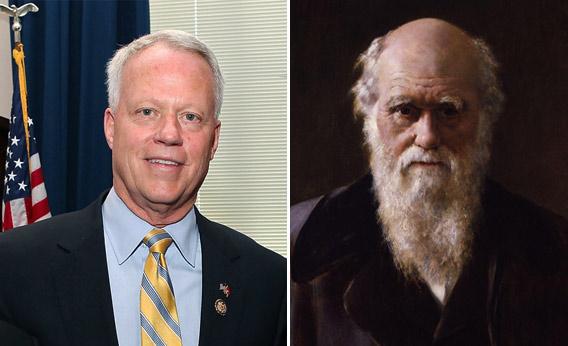Anti-evolution Congressman Paul Broun (R-Ga.) ran unopposed in Tuesday’s election, but nearly 4,000 voters wrote in Charles Darwin to protest their representative’s views. (Broun called evolution “lies straight from the pit of hell.”) Darwin fell more than 205,000 votes short of victory, but what would have happened if the father of evolution had out-polled Broun?
Broun still would have won. Georgia, like many other states, doesn’t count votes for write-in candidates who have not filed a notice of intent to stand for election. Even if the finally tally had been reversed, with Charles Darwin winning 209,000 votes and Paul Broun 4,000, Broun would have kept his job.
That’s not to say dead candidates can’t win elections. It happens all the time, but only when the candidate dies after being placed on the ballot. In Tuesday’s election, Orange County, Fla., tax collector Earl Wood won more than 56 percent of the vote, even though he died in October at the age of 96 after holding the office for more than 40 years. Florida law allowed the Democratic Party, of which Wood was a member, to choose a candidate to receive Wood’s votes. In Alabama, Charles Beasley won a seat on the Bibb County Commission despite dying on Oct. 12. (Beasley’s opponent lamented the challenge of running a negative campaign against a dead man.) The governor will appoint a replacement.
If a dead candidate is elected to the House of Representatives, Article 1, Section 2, Clause 4 of the Constitution requires that the state hold a special election to fill the seat. The entire process, including nominations and primaries, must be run again, so the process usually takes several months, during which time voters are without representation in the House. The Senate is a different story. Until the passage of the 17th Amendment in 1913, Senators were selected by state legislatures rather than direct election, so the Constitution has no provision to fill vacant Senate seats. Most states allow the governor to appoint a Senator if the person elected is unable to serve.
Far stranger write-in candidates than Charles Darwin have won elections. Brazilian voters elected a goat to the Jaboatão City Council in 1955, then elected a rhinoceros named Cacareco (“rubbish”) four years later. (Election officials nullified the animals’ votes and held special elections.) The current mayor of Talkeetna, Alaska, is a cat named Stubbs. Goats and dogs have also held elected office in the United States.
Got a question about today’s news? Ask the Explainer.
Explainer thanks Doug Chapin of the University of Minnesota and Rick Hasen of the University of California, Irvine School of Law.
Video Explainer: Why do parrots mimic humans?
